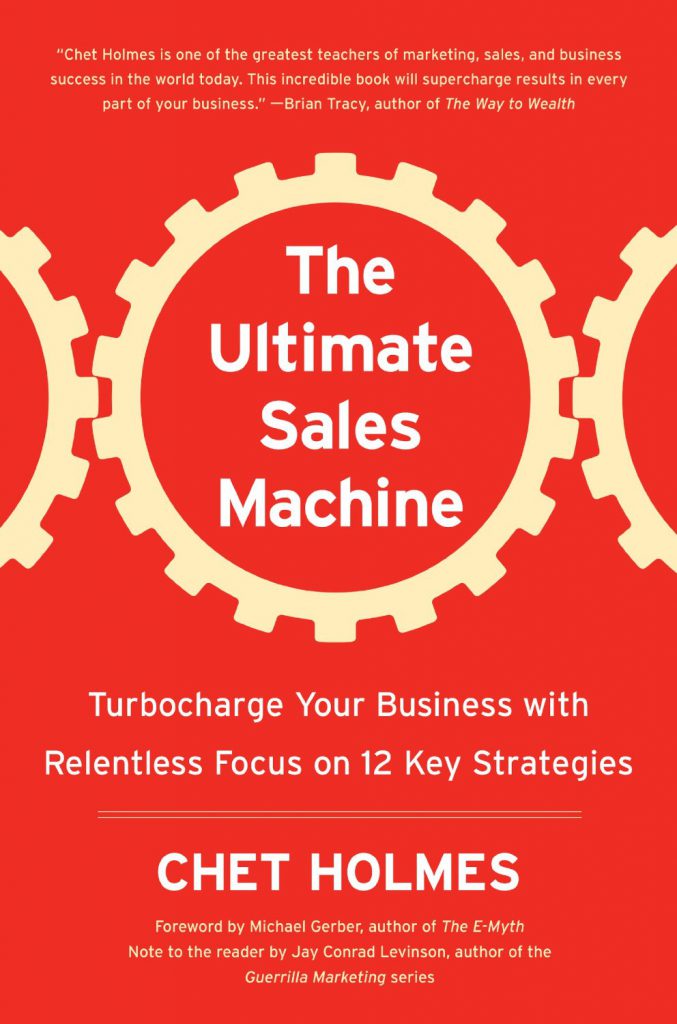 The Ultimate Sales Machine by the late Chet Holmes, if followed on its word alone, is a guide to being the most obnoxious sales person in history, and running the most uptight company ever. But, this is a title that is also held dear to the hearts of many very successful people. It’s not his specific advice–much of which has evolved quickly since the book was published in 2007–it’s the spirit of his advice that’s actually shockingly potent.
The Ultimate Sales Machine by the late Chet Holmes, if followed on its word alone, is a guide to being the most obnoxious sales person in history, and running the most uptight company ever. But, this is a title that is also held dear to the hearts of many very successful people. It’s not his specific advice–much of which has evolved quickly since the book was published in 2007–it’s the spirit of his advice that’s actually shockingly potent.
This book taught me that I am not a sales person. It’s not in my blood. That’s not a mark against me, and Holmes wouldn’t think so either. But as a business owner, it means I should probably find some help. A good sales person is a combination of empathy and a strong ego. In other words, easily putting yourself in another’s position, and also really believing you have what they need. This is an important concept to the rest of Holmes’ machine analogy–a machine needs the right parts to run efficiently.
The analogy runs deep. Machines function with precision, a sales person and a sales force have to operate with the same precision. That’s the analogy at the core of all of the strategies: machine like precision. So, the book is aimed not just at improving the individual salesman, but the entire sales effort within a company.
He implements a dizzying array of acronyms and numbered lists in topics like sales training, running productive meetings, long-term strategy, sales force hiring, lead generation and culling, marketing and blah blah blah. Seriously, there was good stuff in here, but there’s probably a reason so many recent books balk at the kinds of techniques Holmes promotes.
For example, Holmes loves meetings. In the context of his perfect world, they apparently work great. But most business advice these days is all about eliminating as many meetings as possible. They’re generally inefficient and eat up more revenue than they produce.
But the point isn’t that Holme really thought meetings were great. It was that, without a more precise technique, they produced the best results. They were great because they met an important end better than any other method he’d found. Training, or consolidating communication, or interoffice competition, or whatever. If Holmes were alive today, I think he might be revising the technique, but not the end they met. It’s all about “Pig headed discipline and determination.”
Pigheaded discipline and determination. That’s what virtually every single piece of Holmes’ advice boiled down to. That’s not a complaint. We’re not going to get it on the first try. And, most things that are seriously worth our time, we probably still aren’t getting it on the 50th try. Why do successful people seem like pompous assholes so often? Probably because we’re all a little jealous. But also because pompous assholes tend to keep trying and trying and trying when they want something.
This is a cutting piece of advice that, truthfully, I haven’t read elsewhere in recent books. Perhaps because it seems like common sense. Or because authors feel like it’s been discussed enough. Or because it smacks of an out-moded business style. But I disagree and I found it a breath of fresh air. Us young business people, we give up too quickly. Often times without even trying. Sometime we think we’re trying, but we haven’t actually done anything.
In Conclusion
I really enjoyed this book. It was funny the way some of the film gimmicks from the 70’s were funny. The underlying philosophies, however, were dead serious. It was a great challenge, and a really interesting perspective. If you’re running a business, I definitely recommend it.

Recent Discussion